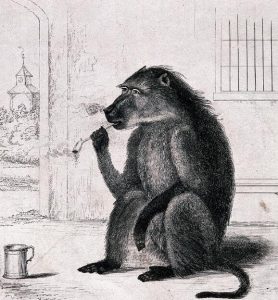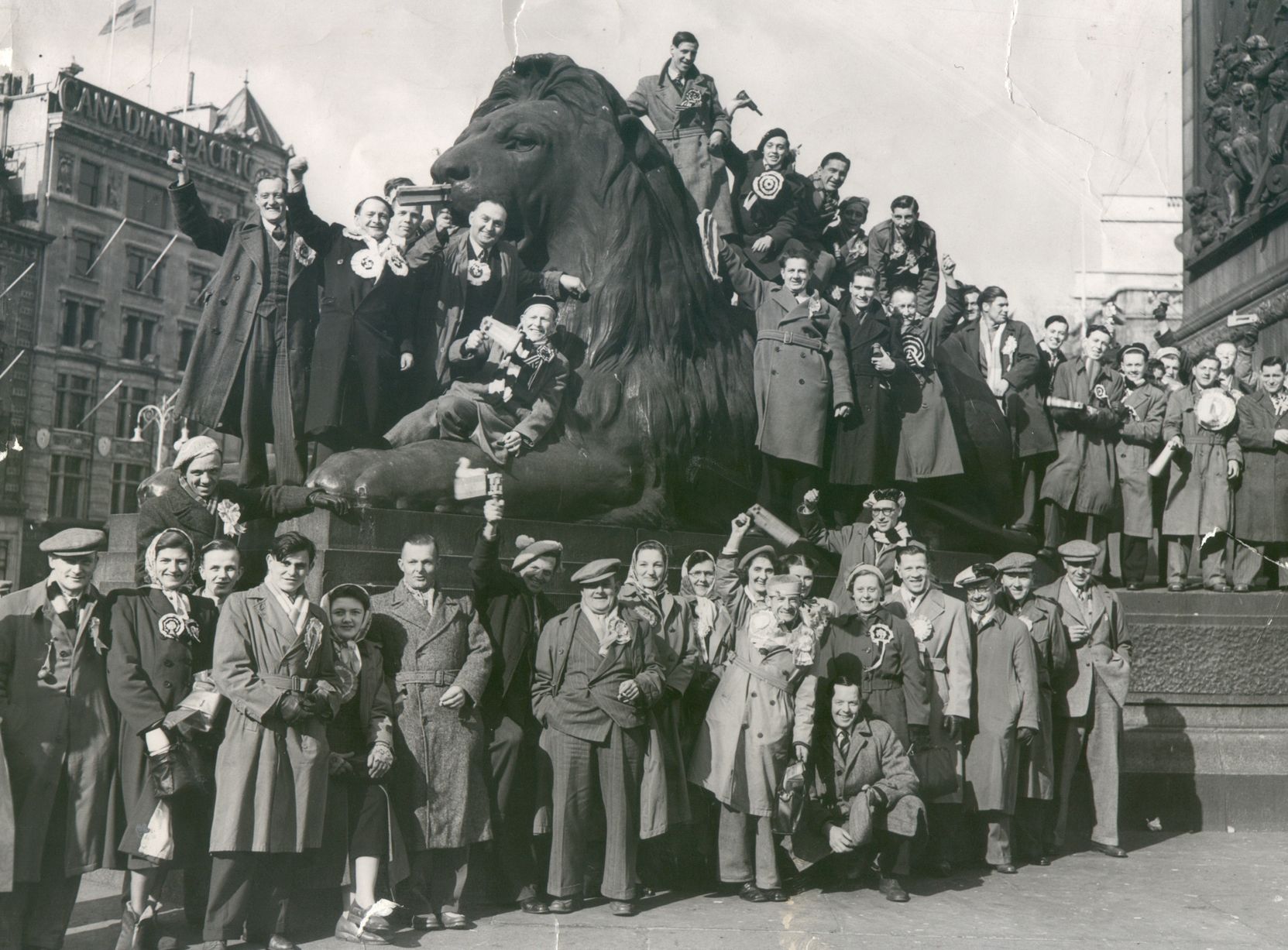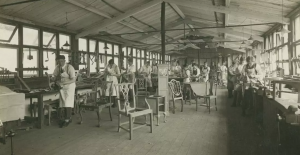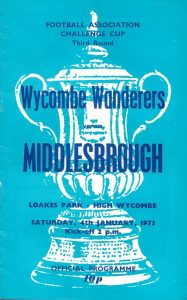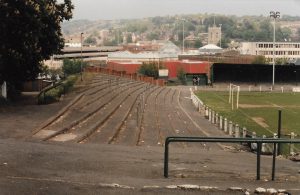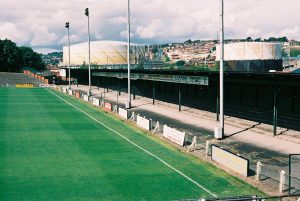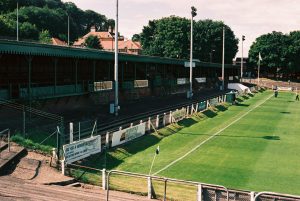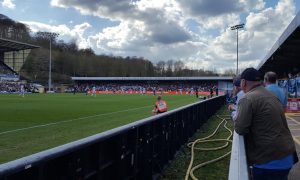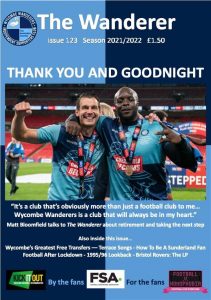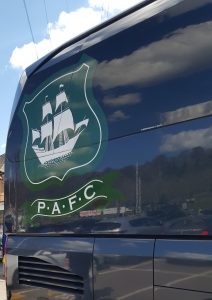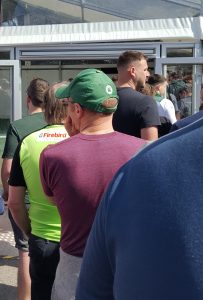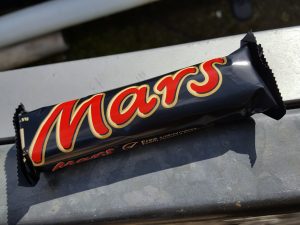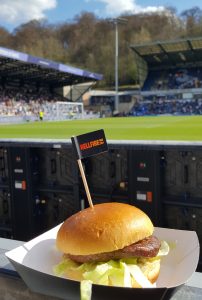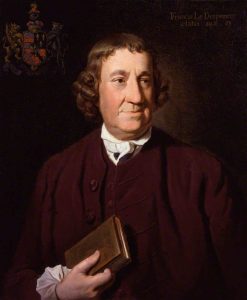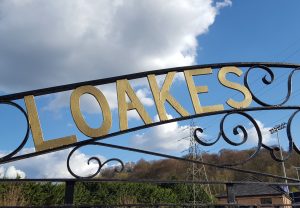Wycombe Wanderers 2 Plymouth Argyle 0
League 1
Saturday 15 April 2022

couldn’t be arsed
The context
Wycombe felt like a reasonable choice for Good Friday. Although – like most places – we had both been before, vague shared memories told us it was easily accessible, reasonably welcoming and probably free of significant Bank Holiday traffic. No-one in their right mind would make for the Hellfire Caves on this year’s hottest afternoon so far.
The history
Sir Francis Dashwood – local landowner, merchant and MP – relieved agricultural hardship in the mid 1700s by paying unemployed farm hands to excavate chalk caves beneath hills overlooking West Wycombe village. His altruism diminished ever so slightly when he then used the quarter-mile network for meetings of the notoriously louche Hellfire Club. Black magic, satanic rituals and orgies became favourite pastimes among artists, politicians and diletantes who comprised Dashwood’s set; the Earl of Sandwich gained lasting ridicule among these companions by drunkenly thinking a baboon was Satan.
Modern Wycombe is more prosaically known for furniture. Nearly 5,000 chairs were made here every day during Victorian times; the town’s population trebled as workers flocked to companies such as Glenisters, G-Plan and Parker Knoll. Its football team – founded in 1887, almost inevitably by workers at a furniture factory – accordingly became known as the Chairboys.
Wanderers moved to Loakes Park in 1895 and stayed for ninety-five years. Wycombe General Hospital stood next door; this circumstance eventually forced them to leave following the site’s compulsory purchase. 16,000 once attended an Amateur Cup tie there, but capacity had been set at 12,000 when Middlesbrough famously visted for a third round FA Cup game in 1975 (this finished 0-0 and Jack Charlton’s First Division side were fortunate to win the Ayresome Park replay 1-0).
- extensive
- much-loved (Bob Lilliman)
- ornate (Bob Lilliman)
Loakes Park was quaintly substantial. Extensive concrete terraces backed each goal, the much-loved Cowshed occupied one touchline and an ornate 1000-seater stand stood opposite. It became best-known for the epically sloping pitch; this – like Yeovil’s of the same era – dropped eleven feet from one side to another.
The journey
Dull weather became more pleasant as I travelled south. Motorways were quiet but dominated by half-asleep weekend drivers. We arrived in Wycombe soon after one – delayed only slightly by unexpected diversions around Warrington, and gamers heading for their convention at the NEC – before street parking high up on long-suffering residential streets across Lane End Road.
People in the car next to mine joked about how much climbing we would do to get back there afterwards. They had a point; Wycombe nestles among hills, and this particular one is of near Forest Green proportions. There are few other options though. The ground has car parking – a sloping farmer’s field you need to pre-book – but its single access route is also used by fans on foot. You can take hours to escape even when the crowd is small.
The ground
Thousands of punters circled baking tarmac like dehydrated seagulls. Despite rural surroundings – which once led Simon Inglis to compare it with Tolkien’s Middle Earth – Adams Park is located at one end of the neighbouring industrial estate’s very long access road. This isolation used to be charming but has recently encouraged steady expansion into a massive fanzone. Today’s game was important, with a near-capacity attendance expected; everyone accordingly turned up good and early to mill around aimlessly for an hour or two.
Adams Park dates from 1990 when Wycombe were a Conference side. Its original long, low main stand survives intact and we had tickets here; in a nice touch, fans with seats can also choose to stand pitchside in front of the open paddock. Covered terracing to our right was also part of that original build, while the seated away end and bigger stand opposite are more recent developments.
Relaxed vibes prevailed despite a large crowd, packed travelling support and the game’s six-pointer status. Red kites wheeled in blue skies above the Woodlands Stand (there’s a bird sanctuary on the forested hill behind). Adams Park is licensed for 10,000 but can hold more; this balance in hand was created by the visitors’ stand being extended, and means neither terraced area is ever completely filled.
Flesh and wine
I spent valuable drinking time trying to find a programme seller before giving up and asking in the club shop, where I was told “We don’t do them any more. You have to go online.” That proved pointless too because Wycombe had apparently stopped bothering altogether during mid-season.
I like to buy a programme. So (even in a digital age) do many others. At the same time, I appreciate they take time and money to produce that some clubs consider is better spent elsewhere. But none of us ever asked for glossy, feature-packed “match magazines” in the first place – we just wanted a souvenir of the game that reminded us who was playing. And that’s all we want now. Sadly, though, the current generation of media managers seem increasingly unable to grasp that simple concept. If I’d known there wasn’t even a digital edition – and that Wycombe ignore polite emails requesting team sheets – I would have gone somewhere that was prepared to make the effort.
Futile search over it was time to dodge the crowds surrounding Argyle’s team coach and look for some beer. There’s one pub a mile away that comes highly recommended, while another mildly notorious boozer even further off has Saturday lunchtime strippers – by and large, though, this is captive audience territory. We headed for one of the ground’s several bars. This had some vaguely Scottish name and no bitter on sale. The queue for time-saving contactless payment was out of the door by the time I’d drunk an (admittedly reasonable) pint of stout, so we headed off into the boiling sun again.
The visiting fans’ beer tent promised more atmosphere and also offered something at least resembling a proper pint. I faced no competition for it, either, because hundreds of milling janners had realised they had cider on sale. Unfortunately, though, the card reader was playing up and another four-deep crocodile ensued. If only some simple alternative payment method existed.
Various caravans and other flimsy structures sold big sausages, gourmet burgers and the like. No cheap rubbish here. We didn’t fancy that much so decided to get something inside, without however realising the club’s gas supply had failed and they couldn’t heat anything up. Visiting the pie hatch two distinctly underworked teenagers – proudly indicating some crisps and Mars Bars – said I could choose whatever else I liked. Work, rest and play then; to add insult to injury, a roar from the crowd greeted Garath McCleary’s fourteenth minute goal as I was being charged (virtually, in the hope I wouldn’t notice) what still felt an outrageous sum of money.
Stewards opened the gates at half time so people could go outside and buy food. We still didn’t fancy it, but – now being forty-five minutes hungrier – chose discretion over valour and bought some “Hellfire burgers”. They were tasty enough and came with a little flag, so that’s nice; I think Dashwood would have been disappointed, though, because at £9 each the only naughty thing about them was the price.
The game
Today’s match had been chosen to celebrate Matt Bloomfield’s career. The first team coach retired from Wanderers’ midfield last February after nineteen years and five hundred appearances. Various commemorative events took place before kick-off, but – due to that forward-thinking programme policy – people a few years from now will have no idea anything ever happened. This is sheer neglect. History belongs to us all; some of its guardians at football clubs need to start taking their responsibilities seriously. Luckily the Wanderer fanzine had produced a special edition marking Bloomfield’s big day. Their friendly volunteers easily sold them all.
Plymouth were fourth and Wycombe – only outside the play off places on goal difference – started five points behind. To listen to John you’d have thought the opener I missed was reminiscent of Messi scoring against Liverpool in 2019; McCleary soon got one I did manage to witness, sidefooting Brandon Hanlan’s square pass under Michael Cooper. The away team could have done with injured captain Joe Edwards and leading scorer Ryan Hardie. They conceded again shortly afterwards but the referee disallowed it for a foul on Cooper.
Argyle – imperious when we saw them at Home Park not long before – now looked to be running out of steam. Steven Schumacher threw on two attacking subs after the break; despite this gamble a high-energy (if somewhat unsophisticated) Wycombe display easily brushed aside his team’s neat tiki-taka. Today belonged to sartorially-perfect home manager Gareth Ainsworth, who – in blue jeans, open-necked shirt and crocodile-skin boots – gave an animated display of rock-star coaching methods just in front of us.
Fay ce que voudras, as the Hellfire Club liked to say.
Teams and goals
Wycombe Wanderers: Stockdale, McCarthy, Tafazolli, Forino, Jacobson, Gape (Grimmer 80), Scowen, McCleary (Obita 88), Horgan (Wheeler 70), Hanlan, Vokes. Unused subs: Kaikai, Akinfenwa, Dickinson, Pendlebury.
Plymouth Argyle: Wilson, Scarr, Gillesphey, Sessegnon, Camara, Houghton (Randell 74), Mayor (Broom 45), Grant, Jephcott, Garrick (Ennis 45). Unused subs: Burton, Law, Crichlow, Craske.
Goals: McCleary 14, 31
Attendance: 8,181.
